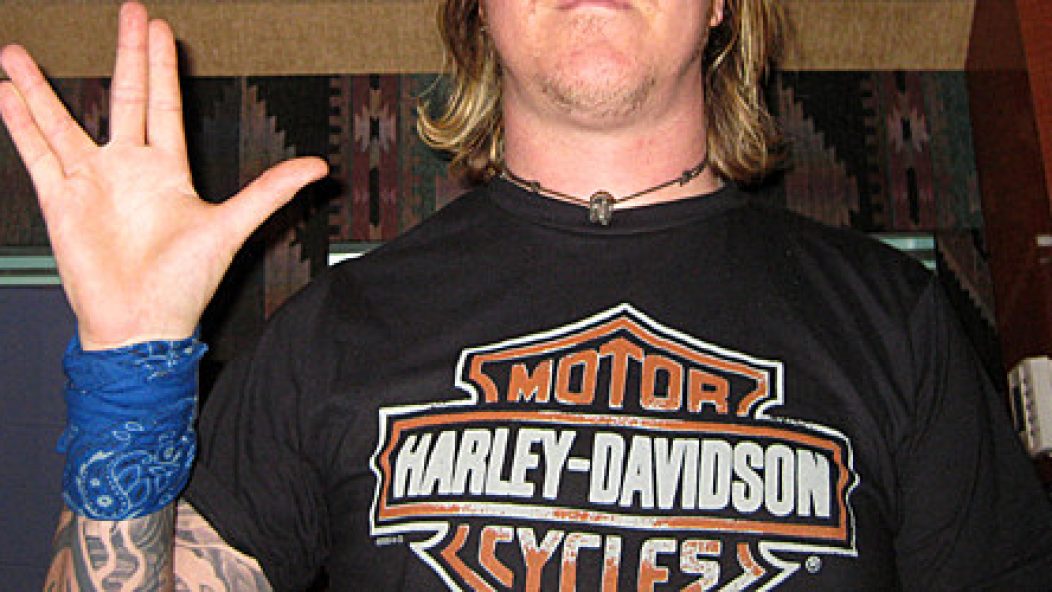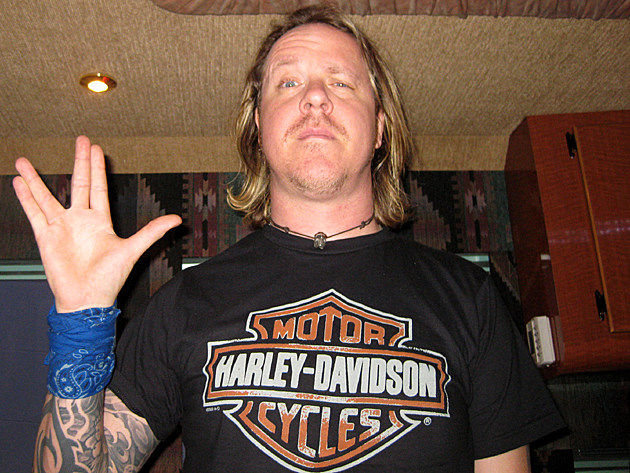
Interview: Burton C. Bell (Fear Factory)
Fear Factory‘s albums and imagery are strongly based on science fiction, particularly dystopic tales about machines taking over the Earth and subjecting mankind to slavery and imprisonment. Much of this fixation comes from vocalist Burton C. Bell, who converted his childhood fantasies into lyrics and stories that have been the backbone of Fear Factory for two decades. Their 1998 album Obsolete is best known for a cover of Gary Numan’s song “Cars”. What you might not know is that the album’s concept – a man vs. machine story – was initially inspired by a Twilight Zone episode.
Science fiction continues to play a role in the band’s latest album Mechanize (reviewed here), which describes a world where humans are so reliant on technology that they’ve formed a symbiotic relationship with machines. Bell recently took a few minutes in his tour bus to discuss his love for science fiction, growing up as a Star Trek fan, liberating action figures from their boxes, and pivotal science fiction movies.
. . .
How did you get into science fiction as a kid?
How could you not, really? It’s fascinating, the concept of space travel, lasers, teleportation. My father was a Trekkie, and because of him I watched the original Star Trek. Because of that, I would watch space movies and be fascinated. I remember the first science fiction book I tried to read was Robert Heinlein, one of his books.
Was it Stranger In A Strange Land?
Maybe, I can’t remember. I was reading it in fourth grade. But I loved the concepts of different times and places and how writers could really take science they knew and move it forward.
Did your fixation with science fiction predate your involvement with music?
Oh yeah, this was like in elementary school. I was singing in church and school choirs, but that wasn’t my music. We were doing melodies from Grease.
Do you remember the first time you saw Star Trek? What did you think?
I liked the ship. The Enterprise was really cool. I liked the humanoids they interact with from other worlds. And the stories were just incredible. I only had a grasp of what was going on, but it made me think a lot.
Fear Factory talks about the pitfalls of modernity and industrial culture. But your band is reliant on technology to make your music. Have you considered that paradox?
It makes me think about George Orwell and 1984. His story is about a world based on martial law. That’s what the machine is. From my perspective, the machine is more the establishment and the government and the world we live in than a physical machine.
There’s some aspects of the machine in The Terminator, Blade Runner, and RoboCop that I enjoyed. A big aspect of The Terminator was the idea of the machines taking over. It was a physical machine, but there was also the concept of machines taking over as a full-on political entity. The more we advance with technology and rely on technology to take care of us, there is that concern.
. . .
The Terminator original trailer
. . .
People let technology take over their lives because it’s fun or neat. Now it’s ubiquitous.
It’s an addiction. Everything is so easy. I didn’t need a cell phone 15 years ago, but now I can’t live without it. It’s a necessity, more than a Swiss Army knife. Is what this technology offering us really helpful? Is the fact that you can call or text anyone at any moment really helpful in the scheme of things? It offers a false sense of security.
For every science fiction story, you need an antagonist. It’s often a machine. It used to be Martians, but now [the antagonist] is often something man-made, and that’s even more frightening.
What are five science fiction movies you think are absolutely essential?
Blade Runner, that’s the top one. David Lynch’s Dune. THX 1138 offered an interesting vision of the future. I love Alien. And the first Star Wars movie, the original .
Do you collect Star Trek memorabilia?
I used to collect Star Trek and Star Wars stuff, figurines, and ships. I stopped doing it after a while because I realized it was just fool’s gold. I was tired of wasting all the space in my place with cardboard and plastic. I wanted to touch the figurines and play with them. I’m a physical guy, I just can’t just look at them. So I took all of them out of their packages. I kept all of the stuff, I just don’t have it all on display anymore. I got to a point in my life where I didn’t need to buy it. I became a little too practical.
Star Trek or Star Wars?
Star Trek. Each story is plausible and believable. There is real science, real concepts, and real philosophy. Gene Roddenberry was a genius.
Next Generation or the original?
I loved both of them. But Roddenberry perfected Star Trek in The Next Generation. Star Trek was great in the original three years it ran. The Next Generation found a niche after the second season as the characters evolved.
Has it been interesting to witness these technological changes from the beginning of your career until now?
It’s amazing. The recording technology has definitely advanced, and that’s a cool aspect. The uncool aspect has been the Internet with downloading and pirating. It’s destroyed the industry. The industry killed itself.
All of Fear Factory’s album covers have an industrial, stark look that seems influenced by science fiction. Is that something you planned from the band’s inception?
It’s something Dino (Cazares) and I have always strived for in concepts, sounds, and vision. Fear Factory is this entity with a philosophy, and we wanted the covers to convey that.
. . .












